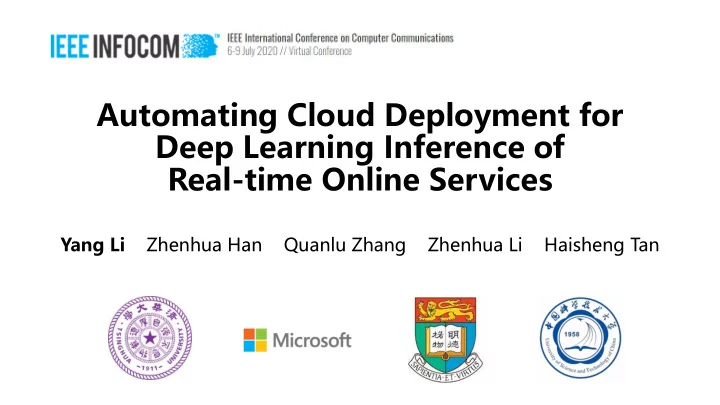

Automating Cloud Deployment for Deep Learning Inference of Real-time Online Services Yang Li Zhenhua Han Quanlu Zhang Zhenhua Li Haisheng Tan
DNN-driven Real-time Services Speech Recognition Image Classification Neural Machine Translation
Cloud Deployment Network transmission time DNN Model Task scheduling time Low Latency DNN inference time require …… Trade-off between Cost Efficiency execution time and economic cost
Cloud Deployment Network transmission time DNN Model Task scheduling time Low Latency DNN inference time require …… Trade-off between Cost Efficiency execution time and economic cost Inference cost (10000 times) of different models across different cloud configurations.
Here come the problems I want to deploy my face recognition service on the cloud. Given a configuration, how can I minimize the DNN inference time? How should I choose the cloud configuration?
Choose Cloud Configurations • Choose cloud configurations Both of them provide over 100 types of cloud configurations! Example: 2 series from over 40 series on Azure!
Reduce DNN Inference Time • A DNN model can have hundreds to thousands of operations. • Each operation can be placed on a list of feasible devices (e.g., CPUs or GPUs) to reduce execution time. How to choose the optimal device placement plan? Example: the computation graph of Inception-V3
Challenge Cloud Device • Huge search space Configuration Placement Space Space • Inference cost • the price of the cloud configuration * inference time. ($/hour) (second/request) ? How to automatically determine the cloud configuration and device placement for the Black-box inference of a DNN model, so as to Optimization! minimize the inference cost while satisfying the inference time constraint (QoS)?
AutoDeep • Given • A DNN model • Inference time constraint (QoS constraint) • Goal • Compute the cloud deployment with the lowest inference cost • Two-fold joint optimization • Cloud configuration searching • Black-box method: Bayesian Optimization (BO) • Device placement optimization • Markov decision process: Deep Reinforcement Learning (DRL)
Bayesian Black-box Optimization Optimization! • Regard the inference cost of a given DNN model with a QoS constraint as a black-box function 𝑔 . select goal 𝑔 Minimize 𝑔 Cloud Configuration Pool input converge and output iterations Optimize the DNN device placement in A (nearly) optimal cloud the selected cloud configuration and configuration with the optimized calculate inference cost (observation) device placement plan of the DNN.
Optimize Device Placement – DRL Model Attention Decoder Encoder
AutoDeep: Architectural Overview
Experiments – Device Placement Google RL • Algorithm designed by Mirhoseini et al. • [ICML17] Device placement optimization with reinforcement learning • Expert Designed • Experiments on 4 K80 GPUs Hand-crafted placements given by Mirhoseini et al. • Single GPU • Execution on a single GPU. •
Experiments LCF (Lowest Cost First) • Try configurations in the ascending • order of their unit price Uniform • Try configurations with uniform • QoS Constraint Increasing probability Inference cost of RNNLM under Inference cost of Inception-V3 varying QoS constraint under varying QoS constraint
Experiments AutoDeep : Lowest search cost RNNLM Inception-V3
Future work My Email: liyang14thu@gmail.com • Improve learning efficiency • Developing a general network architecture so that re-training is not needed for new DNN inference models • Accelerate DRL training process • … • Optimize the system efficiency • Over 90% of searching time is wasted to initialize the DNN computation graph • Allowing placing operations in a fine-grained manner (i.e., without restarting a job)
Recommend
More recommend